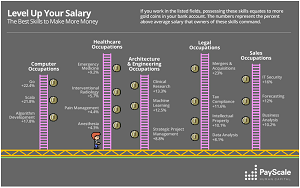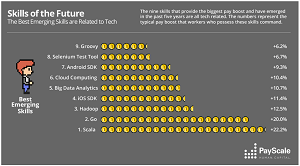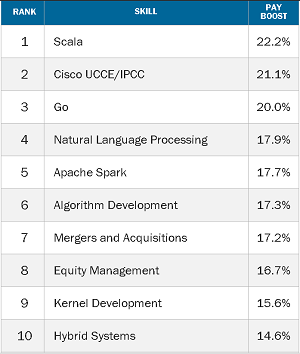News
Looking for a Pay Boost? Learn Scala, Go
- By David Ramel
- May 17, 2016
An ambitious new skills report drawing on salary information from more than 2 million workers reveals that learning the programming languages Scala and Go are excellent career moves for software developers.
Those two languages could provide a pay boost of 20 percent or more, according to the report from PayScale Inc. and Millennial Branding titled Leveling Up: How To Win in the Skills Economy, also called the "2016 Workforce-Skills Preparedness Report."
Though it's a general report designed to assess skills across industries -- not focusing on programming or even tech -- the report clearly indicates software developers are sitting pretty in the current employment picture and are set up nicely for the immediate future. The survey was conducted to gauge the preparedness of recent college graduates to enter the workforce and assess their skills, especially in the context of meeting the expectations of hiring managers. The difference between acquired skills and in-demand skills results in the famous "skills gap" plaguing so many aspects of software development, where Big Data, cloud, mobile and other related talent remains elusive.
The report is partly based on data provided by more than 2 million workers who responded to a PayScale compensation survey from March 2014 to March 2016, along with a group of managers (63,924) and recent college graduates (14,167) who completed the survey early this year.
"We hear all the time about the 'skills gap,' the gap between the skills needed to succeed in the professional world and the skills with which young professionals leave college," said PayScale exec Katie Bardaro in a statement today. "The data we've collected show that even though their education may make recent college graduates feel prepared to enter the workforce, only half of hiring managers agree with them; managers feel crucial skills in recent graduates are frequently lacking or absent."
 [Click on image for larger view.]
The Best Skills to Make More Money (source: PayScale/Millennial Branding)
[Click on image for larger view.]
The Best Skills to Make More Money (source: PayScale/Millennial Branding)
A side benefit of that effort is the revelation of what skills make the most money, the best emerging skills for future growth, best skills to earn a promotion, best skills to leave off your resume and so on.
Scala and Go excel in the "make the most money" department.
"Overall, Scala is the skill that will get you the biggest pay boost (22.2 percent), followed by Cisco UCCE/IPCC (21.1 percent) and Go (20.0 percent)," the report says. "Scala and Go are the emerging skills with the biggest pay boosts (22.2 percent and 20.0 percent respectively), but some other notable emerging skills are Hadoop (12.5 percent), iOS SDK (11.4 percent) and Groovy (6.2 percent)."
Furthermore, "Both Scala and Go are considered to be emerging skills -- skills that have become high in demand in the past five years. They're also, notably, [Science, Technology, Engineering, and Math] STEM skills, an indicator that highly skilled STEM employees are in demand, and STEM jobs consequently command higher salaries."
Scala is where "object-oriented meets functional," according to its Web site. "Have the best of both worlds," it says. "Construct elegant class hierarchies for maximum code reuse and extensibility, implement their behavior using higher-order functions. Or anything in-between."
Go, meanwhile, "is an open source programming language that makes it easy to build simple, reliable and efficient software," according to the Web site for the language initially developed by Google.
Interestingly, neither Scala nor Go made the top 10 lists in recent reports examining the most sought-after skills among freelancers and ranking programming language popularity.
 [Click on image for larger view.]
Best Emerging Skills Related to Tech (source: PayScale/Millennial Branding)
[Click on image for larger view.]
Best Emerging Skills Related to Tech (source: PayScale/Millennial Branding)
And surprisingly, it was no programming language or other tech skill that hiring managers found most lacking in today's report.
"One unexpected finding was, rather than specific software programs or other tech skills, our data indicates that 44 percent of managers feel writing proficiency is the hard skill most lacking among recent college graduates, while public speaking follows with 39 percent of managers feeling this way," the report said.
Unsurprisingly, the emerging skills rounding out the top nine for the biggest pay boosts include a cast of familiar characters, including the aforementioned Big Data analytics, cloud computing and mobile (Android and iOS SDKs). They were joined by the more arcane Selenium Automated Test Tool.
"Considering the explosion of tech-related jobs in the past decade -- or more -- it's no surprise some of the most in-demand skills are related to the tech industry; the nine skills that provide the biggest pay boost and have emerged in the past five years are all tech related," the survey said. "It's also no surprise we expect this trend to continue. Also worth nothing, of these nine skills, seven rely upon expert understanding of programming languages, operating systems or software frameworks."
Tech didn't rank so highly in the "least impressive skills" category, or those better left off your resume. Here, the most "techy" entrants include data entry, AS/400 skills and help desk/desktop support. The two least impressive skills overall were filing and property management.
Money magazine teamed up with PayScale to publish a multi-faceted presentation of PayScale data (54 million employee profiles, across 350 industries, with 15,000 job titles), including the article, The 21 Most Valuable Career Skills Now. Here, "making sense of Big Data" comes into prominent play.
"Although companies have long tracked information about customers, sales, and suppliers, businesses today have access to a far richer vein of information," Money said. "Every time you click on a Web site, shop online, watch a video, or do pretty much anything else, you leave behind crumbs of information." Making business sense of this information is the bailiwick of the "data maven," who can benefit financially from acquired data-related skills.
Specifically, the top data skills and their respective average pay boosts are:
| Skill |
Average Pay Boost |
| SAS (Statistical Analysis System) |
6.1 percent |
| Data Mining/Data Warehousing |
5.1 percent |
| Data Modeling |
5 percent |
Under, "wrangling new tech," the top three are:
| Skill |
Average Pay Boost |
| Search Engine Marketing |
5 percent |
| Customer Service Metrics |
4.3 percent |
| SAP Material Management |
3.9 percent |
"It's hardly news that hard-core tech folks -- coders, IT managers, server administrators -- have a major edge when it comes to valued job skills," the Money article states. "A LinkedIn analysis of the most in-demand skills for 2016, for instance, found that 19 of the top 25 were technology-related, with the top of the list dominated by cutting-edge areas such as cloud computing, software development for mobile devices, and online security.
"But IT skills are only a minor part of the story, says LinkedIn spokesman Joseph Roualdes: 'Tech is in demand across nearly every industry.' "
Money also expanded upon PayScale's "pay boost" data, providing the following top 10 list:
 [Click on image for larger view.]
Top 10 Sills for a Big Pay Boost (source: Money)
[Click on image for larger view.]
Top 10 Sills for a Big Pay Boost (source: Money)
"We looked specifically for skills correlated with higher pay across a broad range of occupations. But sometimes, for any single job, there's one team member who's making an extra chunk of change simply by having this year's hottest skill," Money said.
"Currently, that skill is Scala -- a popular programming language with a wide range of applications, from analyzing biological data to building Twitter. Employees who identified Scala as a core job skill earned 22.2 percent more than their peers, holding constant such factors as job title, experience, age and location. Indeed, of the 25 skills that showed the greatest such payoff, 23 of them are somehow technology related -- whether a coding language, a software program, or a technological approach."
But, regardless of the level of technical chops, today's new job-seekers clearly need a more well-rounded set of abilities.
"Graduates need strong communication and problem-solving skills if they want to interview well and succeed in the workplace, because effective writing, speaking and critical thinking enables you to accomplish business goals and get ahead," said Millennial Branding exec Dan Schawbel. "No working day will be complete without writing an e-mail or tackling a new challenge, so the sooner you develop these skills, the more employable you will become."